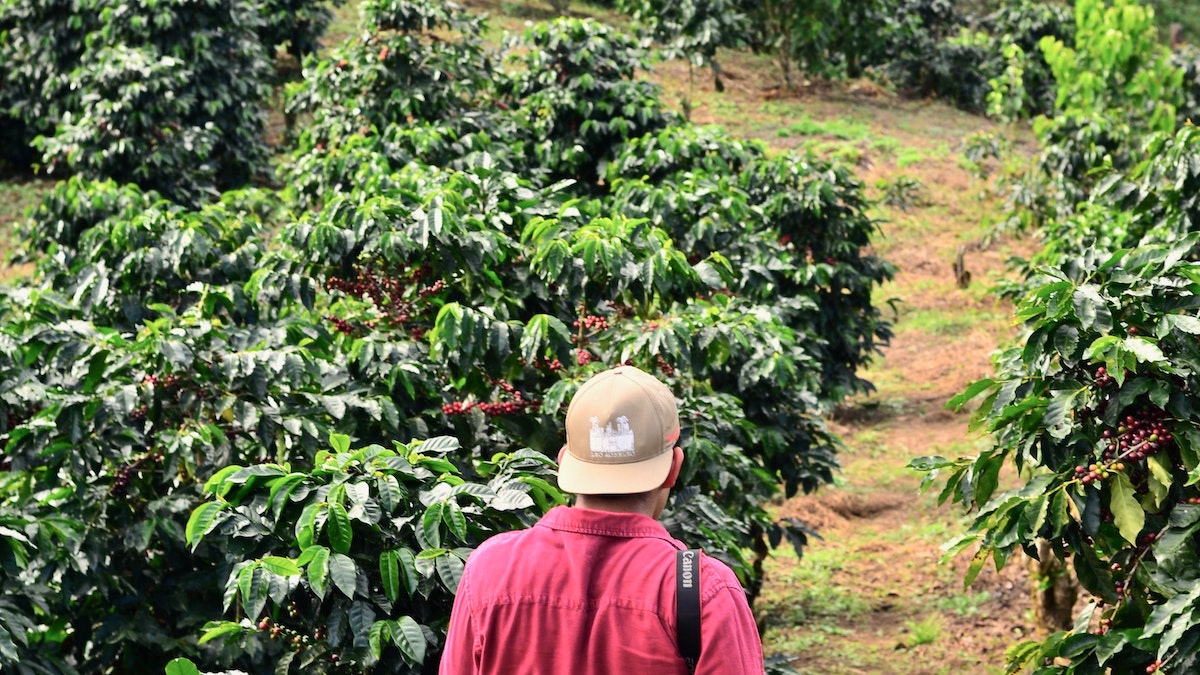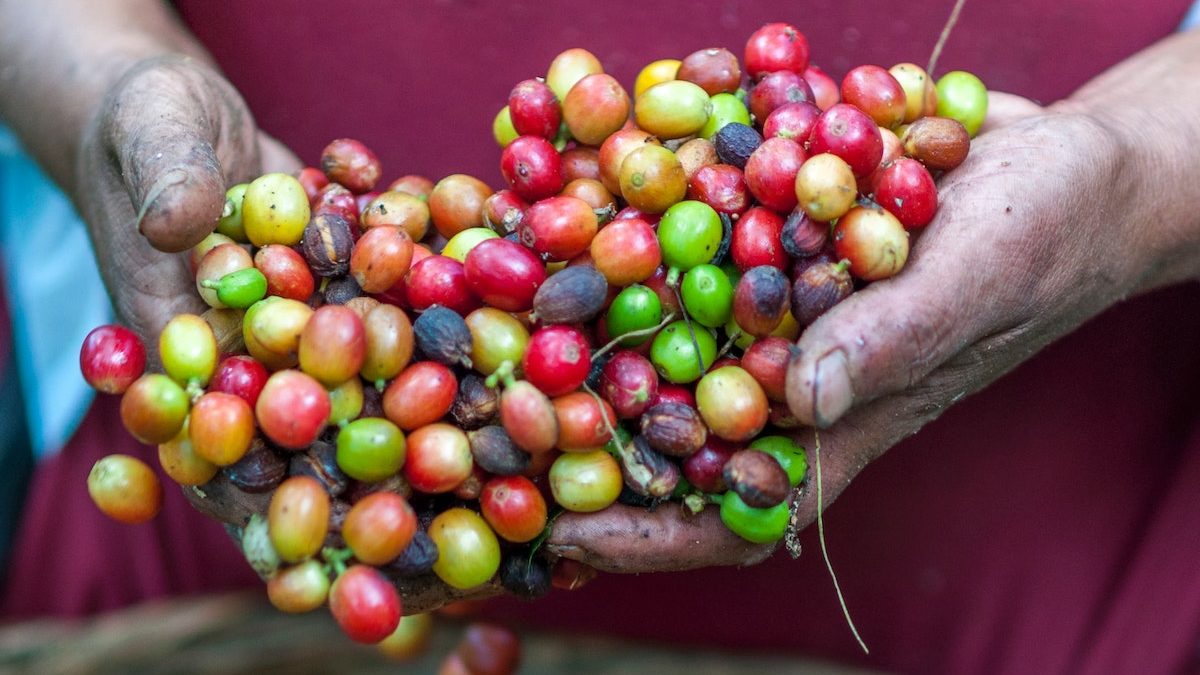Thanks to the hard-working coffee farmers, coffee is everywhere and we are all grateful for it. It doesn’t seem possible, but the challenges for getting quality beans to us at home are quite formidable. In fact, it is a real coffee farmer’s dilemma.
What are some of the challenges that the coffee farmer faces? Quality control, coffee processes, coffee sales, coffee marketing, coffee farm maintenance, specialty grade, climate change, just to name a few.
In our new blog series of “coffee farmer dilemmas” we will illustrate these challenges through the eyes of a smallholder coffee farmer we will call “Antonio”. He is a fictional character. However, the challenges and life’s circumstances are real. Antonio lives in an isolated part of a coffee-producing nation in Latin America. His immediate family consists of his faithful wife, Yanelys, and 2 young children, Lisbeth and Jorge.
Antonio begins his day as he does most every day. He gets up early in the morning, grabs his old towel and walks about 10 meters to the latrine and shower. The water is cold of course and the ground is muddy. His wife, Yanelys, prepares breakfast over an open flame in the makeshift kitchen. The walls are covered in black soot from the wet firewood. We can only imagine how their lungs are.
The kitchen is also separated from the sleeping area of the house. The floors are mud, the walls and roof are made of scrap tin metal sheets found here and there. Most are badly rusted but the holes are covered in rags soaked in tar and pasted to the tin. The sleeping area is a small 3m x 3m area with a mud floor adorned with a makeshift bed in the middle, big enough for the whole family.
“What’s for breakfast, dear?” asks Antonio. He already knows as it is the same every day. Creamed plantains and hot coffee. After a while, Antonio grabs his machete and hat then goes off to his farm. It is not too far, maybe a half-hour walk.
The farm is about 2.5 hectares in size. It is not titled, but his family has been working on it for 2 generations. It is a very beautiful spot with plenty of banana and plantain plants as well as over 2500 arabica coffee plants of the caturra, catuai and tipica varieties. There is always so much to do on the farm.

Right now, it is time to clear the underbrush. It seems like it is always time to clear the underbrush. This has to be done regularly in order to have a better harvest and it is done with a machete. Antonio is a true expert with a machete. That is his number 1 tool. It is truly amazing what a machete can do in his hands.
Antonio has been clearing the underbrush all week. “Finally finished” he sighs to himself as he wipes the sweat from his brow. It was not even 10 a.m., yet. Looking over the farm, he enjoys a sense of accomplishment.
The farm looks lovely as rays of sunlight gently fill the area gracing each plant between the shadows of the canopy trees. We are in the middle of May. The coffee has finished blooming and the buds are growing. “It looks like a promising crop”, thinks Antonio with a proud smile on his face.
There is so much to do to protect the farm. Anything can happen between now and the harvest which usually starts in early October. Tomorrow, Antonio plans on spraying the plants to protect them against fungus’ such as leaf rust fungus (roya), rooster’s eye (ojo de gallo), the two most common fungus’ in the area.
The spray is quite a mix. It is a mixture of fungicides strong enough to protect the plants against fungus’. It also has an insecticide to control against harmful pests such as “coffee borer beetle” (broca). This is a tiny insect that bores a hole in the coffee bean, lays its eggs and moves on. This is terribly damaging to the quality of the beans. The “broca” bug must be stopped.
Another addition to the “soup” is a fertilizer. It is all mixed together with enough water to fill a 45 Imperial gallon drum (55 US gallons). Each leaf of each plant is then sprayed from underneath. This will take Antonio about 3 days including his walking time. Antonio likes to leave the farm around 2 pm each day. This gives him plenty of time to do odds and ends around the house and be with the family.
Now at home, Antonio and Yanelys discuss the best way to maintain the farm on their limited budget. Their only income is what they earned from last year’s harvest. The farm produced just over 380 buckets which yields about 2000 lbs of processed, dried coffee. That was the best year they have ever had. The stricter farming techniques are paying off!

The coffee farmgate price for each bucket filled with fully-matured beans worked out to $7.90 a bucket (US $1.50 a lb). Never before have they earned so much money in one harvest. Yanelys is the one who usually handles the family funds. When it comes to larger purchases, however, they both converse openly and manage to come up with what has always been the best direction.
Today, Antonio comes home a bit earlier. Yanelys heats up some rice and soup for his lunch and places it on the table. The kids and his wife already ate. Antonio takes his seat, clutches his spoon, “Manos a la obra!” (“Get to work, hands”) he says as he takes a mouthful of chicken soup.
“The coffee farm looks good, dear” says Antonio initiating a conversation. “The new farming techniques work well?” asks Yanely. “Oh yes, the new coffee consultant knows what he is talking about. Tomorrow, I want to get the equipment ready for spraying the farm.”
“Do we have enough money to buy the fertilizer?” asks Antonio. “I am not sure, it is so expensive and the children need new boots. The rainy season is about to start” explains Yanelys. “I know, but we need it to ensure a good healthy crop. The beans are so small without it and if there is not enough potassium in the soil, the plants could lose all their leaves which will weaken them, possibly even causing more serious damage to the plants. Remember, that is one of the main reasons why our harvests were so poor before.” rebuttals Antonio.
“You can only stretch a dollar so far” replies Yanelys. “We just have to make due.” “I know, you’re right, Honey. Maybe we can sell some bananas and plantains or maybe I can get some extra work somewhere” says Antonio as he gets up from the table taking his dishes to the sink.
“You know what would really help us? If we had our own little depulper, then we could do wet-processed coffee right here. Our farmgate price would increase as we’d be able to sell washed and dried beans instead of just cherry.” declared Antonio enthusiastically. “Keep dreaming, dear, although that would be nice” answers Yanelys as she touches his shoulder and kisses him on the cheek.
As we can see, Antonio and Yanelys are hard workers, living from hand to mouth. The quality control for coffee farmers involves a lot of labour-intensive activities such as clearing the underbrush up to 5 times a year, spaying each leaf from underneath 3 times a year and laying fertilizer around each plant 4 times a year.
We still haven’t gotten into the wet processing, coffee farm maintenance, coffee harvesting or coffee sales and coffee marketing. We invite you to follow Antonio and Yanelys as they strive to find sustainability in coffee farming.


